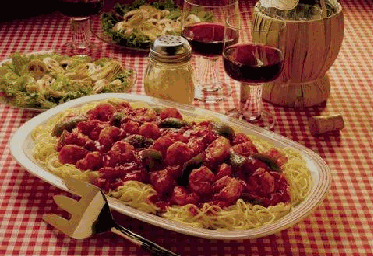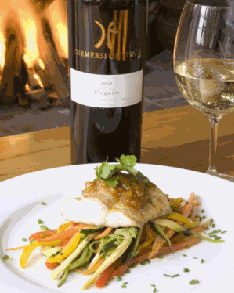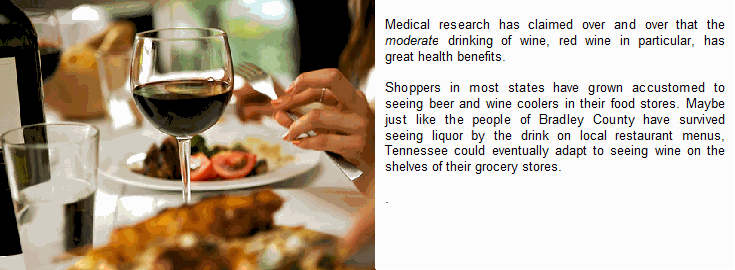|
|
|
|
|
|
|
|
|
|
|
|
|
|
|
|
|
|
|
|
|
|
|
|
|
|
|
|
|
|
|
|
|
|
|
|
|
|
|
|
|
|
The People News, a free newspaper serving Cleveland Tennessee (TN) and Bradley County Tennessee (Tn).
Of Bradley County Tn.
FEBRUARY 2011
|
|
|
|
|
|
|
|
The People News
Special Report
|
|
|
|
|
|
|
HOME
|
|
BACK ISSUE ARCHIVE
|
|
EDITORIALS
|
|
LETTERS
|
|
CONTACT US
|
|
|
|
|
|
|
|
|
|
|
|
|
|
|
|
|
|

|
|
|
|
|
|
|
|
|
|
by Alexandra Edwards
One of the hot topics for state legislatures this year could be whether Tennessee is ready to sell wine in food stores.
During the past several years there has been a growing amount of public support for the sale of wine in Tennessee grocery stores. Last year, Tennessee legislators tried to pass bills SB-3577 and HB 2948 that would allow for local governments to hold a referendum so that the voter can decide if food stores should be allowed to sell wine in their communities. Although, last year the bill gained many more votes than it had done in the past - anything to do with the sale of alcohol is such a very delicate subject for most counties - the bill still failed. Much of the the resistance against allowing wine in retail food stores seems to come mostly from the liquor and spirit store owners; the only place where wine is allowed to be sold in Tennessee.
|
|
|
|
|
|
|
|
|
|
|
|
|
|
|
|
|

|
|
For many years, liquor laws of Cleveland and Bradley County, TN prohibited the sale of wine and spirits being served in local restaurants. Although a few establishments were licensed to sell beer, no other form of alcohol was permitted. Diners that desired a glass of wine or a cocktail with their meal would need to drive to restaurants thirty miles away in Hamilton County/Chattanooga where liquor laws were much less stringent.
Being a strong Christian community in the midst of the Bible Belt, there was nothing strange or surprising that residents of Bradley County would be opposed to the sale of alcohol. Many out-of-towners, like myself, accepted and respected that's the way it was, the way it always had been and was little to sacrifice in order to reside in one of Tennessee's most scenic counties.
|
|
|
|
|
|
|
|
After year's of debate and opposition, proponents for the sale of alcohol in restaurants convinced the community that times were changing and that Bradley County was being left behind. Prominent civic leaders, businessmen and the local Chamber of Commerce stated at public meetings that the county was losing valuable tax revenue by having turned away several potential big restaurant chains. Finally, a signed petition of registered voters enabled a 'liquor by the drink' referendum to be put on the November 2002 ballot and it passed by just 411 votes; 5,445 for and 5,034 against.
Since that time, no excessive increase in DUI's seem to have been reported in Bradley County due to restaurants serving wine and cocktails. No excessive underage drinking. In fact, if anything, local restaurants have become much stricter with carding rules. Most surprisingly though, the majority of residents of Bradley County seem to have quietly adapted to restaurants selling alcohol and those that haven't still continued to frequent their favorite local restaurants as they always used to.
|
|
|
|
|
|
|
|
Although wine is considered an alcoholic beverage, because it pairs so well with food, to many consumers it is an important addition to their meal. For many people, whether it is entertaining guests for a special dinner or looking for a nice Chianti to go with the spaghetti and meatballs, there is nothing like a good glass of wine to enhance the meal. Perhaps had wine been put in the category of food and beverages where it truly belongs, rather than alcohol and liquor, it would be accepted and appreciated for the wonderful accompaniment to meals that it has been for many centuries.
Many websites have been set up throughout Tennessee campaigning to change the laws that currently prohibit wine sales in grocery stores.
|
|
|
|

|
|
|
|
|
One of the most prominent is Redwhiteandfood.com where over 25,000 Tenneaseans have registered for the cause. Jarron Springer, president of the Tennessee Grocers and Convenience Store Association, being pleased with the public response said that should such a bill go through "the sale of wine in grocery stores could add $20 million in tax revenues to state and local governments. However, a December article in the Tennessee Report revealed "the beer, wine and liquor interests gave more than $576,000 to state level candidates last year, making the industry one of the top 10 contributors and, of course, one of the most influential on Capitol Hill." Those numbers could make any proposal in 2011 to sell wine in grocery stores, look quite bleak.
|
|
|
|
|
|
|

|
|
State liquor retailers have lobbied against previous bills claiming that the sale of wine in grocery stores would increase access to alcohol by minors, hurt the liquor retail business, costing jobs, forcing many to close.
The liquor store industry also argues that by allowing grocery stores and large chain stores like Walmart to sell wine would put them at an unfair disadvantage. Current Tennessee law prohibits a liquor store from selling other products such as non alcoholic mixers, snack foods and wine gadgets. Permitting liquor retailers to sell such items have been considered as a compromise should the wine bill go through again this year.
Thirty three states in the US allow the sale of wine in retail food stores including six states bordering Tennessee.
Tennesseeans are not the only consumers currently pushing for wine sales in grocery stores. Oklahoma and surprisingly, New York, America's heart of culture, is void of wine in the aisles of their food stores.
|
|
|
|
|
|
|
|
Susan Hayes in the www.Buffalowtimes.com writes, "When other states have allowed consumers to buy wine in grocery stores, consumers have responded by buying more wine. When Washington State began selling wine in grocery stores, wine sales jumped 53 percent. In 1985, when Iowa began selling wine to consumers in grocery stores, wine sales skyrocketed 80 percent. With the economy sputtering, a boost in sales would make a huge difference for small businesses."
|
|
|
|
|
|
|

|
|
|
|
|
|
HOME
|
|
BACK ISSUE ARCHIVE
|
|
EDITORIALS
|
|
LETTERS
|
|
CONTACT US
|
|
|
|
|
|

|
|









